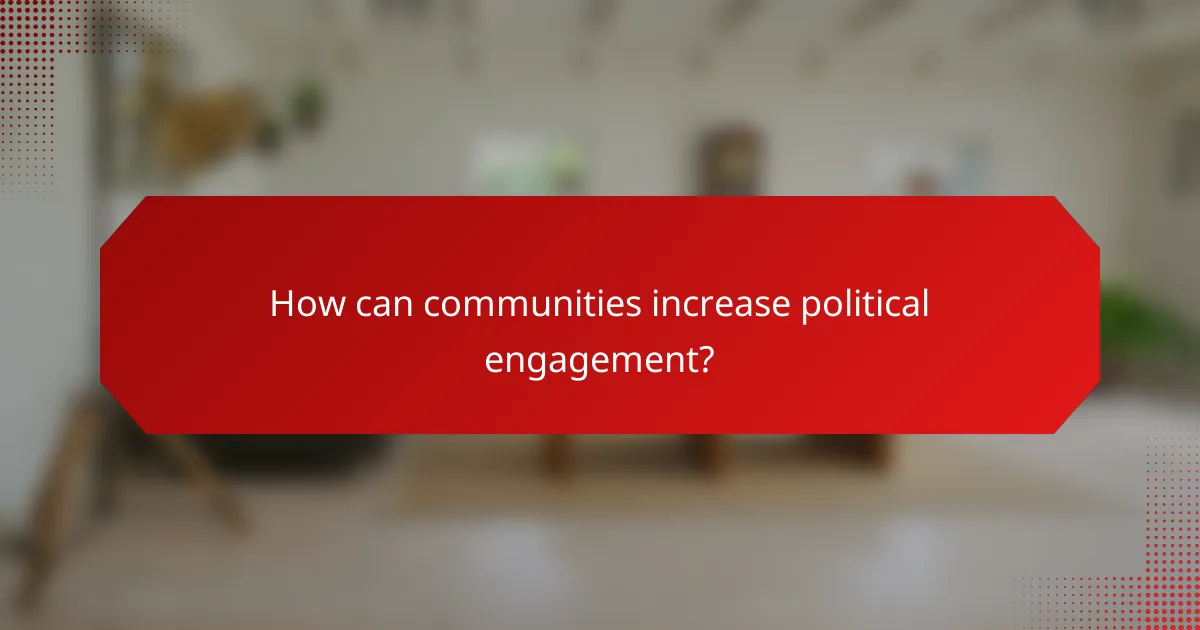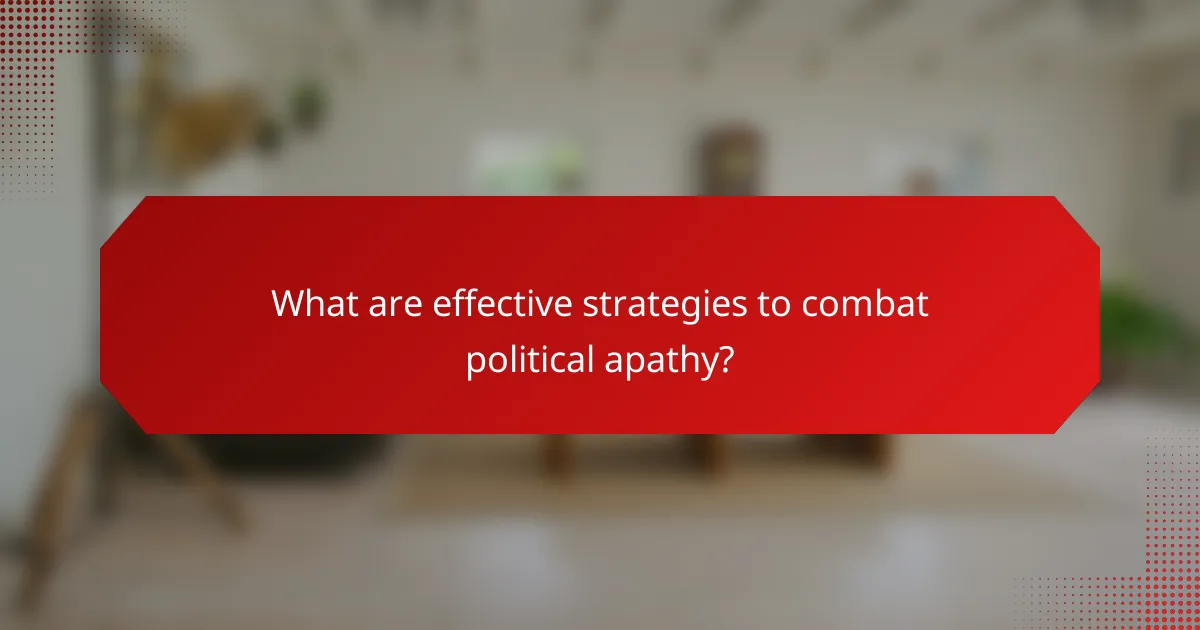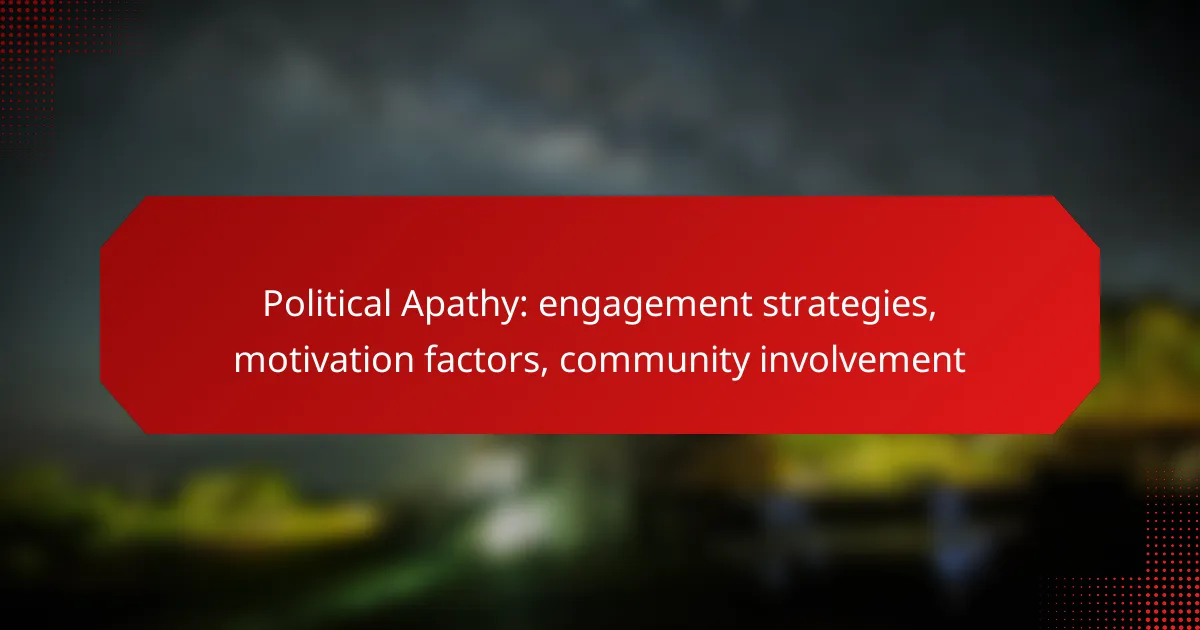Political apathy poses a significant challenge to democratic engagement, yet communities can implement effective strategies to inspire participation and awareness. By understanding the motivating factors behind individual involvement, such as personal impact and social responsibility, communities can create targeted initiatives that encourage active political engagement. Utilizing technology and educational programs further enhances outreach efforts, fostering a more informed and involved citizenry.

How can communities increase political engagement?
Communities can boost political engagement through various strategies that foster participation and awareness. By implementing targeted initiatives, they can motivate individuals to become more involved in the political process.
Community forums
Community forums serve as platforms for residents to discuss local issues and share opinions. These gatherings can be organized in-person or online, allowing for broader participation. Effective forums should encourage open dialogue and provide a safe space for diverse viewpoints.
To maximize engagement, consider inviting local leaders or experts to speak, and ensure that the discussions are well-facilitated. Regularly scheduled forums can help build a habit of participation among community members.
Voter registration drives
Voter registration drives are essential for increasing political participation, especially in areas with low registration rates. These events can be held at community centers, schools, or during local events to reach a wider audience.
To run a successful drive, provide clear information on how to register, including deadlines and required documentation. Collaborating with local organizations can enhance outreach and ensure that diverse populations are represented.
Local advocacy groups
Local advocacy groups play a crucial role in mobilizing community members around specific issues. These organizations often focus on areas such as education, healthcare, or environmental protection, providing a platform for individuals to take action.
Joining or forming advocacy groups can empower residents to influence local policies. It’s important to maintain clear communication and set achievable goals to keep members motivated and engaged.
Public workshops
Public workshops offer hands-on opportunities for community members to learn about political processes and civic engagement. These sessions can cover topics like understanding local government, the voting process, or how to advocate for change.
Workshops should be interactive and tailored to the interests of participants. Providing resources and follow-up support can help attendees apply what they’ve learned in their communities.
Social media campaigns
Social media campaigns are effective tools for raising awareness and encouraging political engagement among younger demographics. By utilizing platforms like Facebook, Twitter, and Instagram, communities can share information and mobilize support for various initiatives.
To create impactful campaigns, use engaging visuals and clear calls to action. Regularly update content and interact with followers to maintain interest and foster a sense of community online.

What motivates individuals to participate in politics?
Individuals are motivated to participate in politics by a combination of personal impact awareness, social responsibility, and peer influence. Understanding how these factors interact can help foster greater political engagement within communities.
Personal impact awareness
Personal impact awareness refers to the recognition that individual actions can lead to meaningful change in political outcomes. When people understand how their vote or participation can influence local policies or elections, they are more likely to engage.
For example, individuals who see direct effects of legislation on their lives, such as education funding or healthcare access, may feel compelled to participate in political discussions or voting. This awareness can be cultivated through community education initiatives that highlight the link between civic engagement and personal well-being.
Social responsibility
Social responsibility is the belief that individuals have an obligation to contribute to the welfare of their community and society. This sense of duty can drive people to participate in political processes, believing that their involvement is essential for the greater good.
Community service projects or local advocacy groups often emphasize this concept, encouraging individuals to take action on issues like environmental protection or social justice. By framing political participation as a civic duty, organizations can motivate more people to engage actively in politics.
Peer influence
Peer influence plays a significant role in motivating individuals to participate in politics. When friends, family, or colleagues are politically active, it can create a social norm that encourages others to join in.
For instance, if a group of friends regularly discusses political issues or participates in campaigns, others in the group may feel inspired to do the same. Creating environments where political conversations are common and valued can help increase overall engagement in civic activities.

What are effective strategies to combat political apathy?
Effective strategies to combat political apathy include fostering community engagement, utilizing technology for outreach, and implementing educational programs. These approaches aim to motivate individuals to participate actively in political processes and local governance.
Educational programs
Educational programs play a crucial role in reducing political apathy by informing citizens about their rights and responsibilities. Workshops, seminars, and community classes can cover topics such as civic engagement, voting processes, and local governance structures.
Consider partnering with local schools and universities to create curricula that emphasize the importance of political participation. Engaging youth through interactive learning experiences can cultivate a sense of responsibility and encourage lifelong civic involvement.
Engagement through technology
Technology can significantly enhance political engagement by providing platforms for discussion and information sharing. Social media, mobile apps, and online forums allow citizens to voice their opinions, learn about political issues, and connect with like-minded individuals.
Utilize tools such as online petitions, virtual town halls, and interactive surveys to gather feedback and foster dialogue. Ensure that these platforms are user-friendly and accessible to encourage participation across diverse demographics.
Collaborative projects
Collaborative projects can unite community members around common goals, fostering a sense of ownership and engagement. Initiatives such as neighborhood clean-ups, local advocacy campaigns, or public art projects can inspire collective action and political awareness.
Encourage partnerships between local organizations, businesses, and residents to create impactful projects. This collaboration not only addresses community needs but also builds relationships that can lead to increased political participation and advocacy for local issues.

How do demographics influence political participation?
Demographics significantly affect political participation by shaping individuals’ motivations, access to resources, and engagement levels. Factors such as age, socioeconomic status, and ethnic diversity play crucial roles in determining how and why people engage in political processes.
Age-related trends
Age is a critical factor in political participation, with younger individuals often showing lower engagement levels compared to older generations. For instance, those in their twenties may prioritize different issues or feel less connected to traditional political structures.
As people age, they tend to become more politically active, often due to increased stakes in community and economic stability. This trend can be seen in voting patterns, where participation rates typically rise with age, particularly among those over 50.
Socioeconomic factors
Socioeconomic status greatly influences political engagement, with individuals from higher income brackets generally participating more actively in politics. This can be attributed to greater access to resources, education, and networks that facilitate involvement.
Conversely, those from lower socioeconomic backgrounds may face barriers such as time constraints, lack of information, or feelings of disenfranchisement. Addressing these barriers through community programs can enhance participation among these groups.
Ethnic diversity
Ethnic diversity within a community can lead to varying levels of political participation, as different groups may have distinct experiences and motivations. For example, minority groups may engage more actively in advocacy to address specific issues affecting their communities.
However, systemic barriers such as language differences, cultural misunderstandings, and historical disenfranchisement can hinder participation. Initiatives that promote inclusivity and representation can help bridge these gaps and encourage broader engagement across diverse populations.

What role do local leaders play in fostering engagement?
Local leaders are crucial in fostering community engagement by setting the tone for participation and involvement. They can inspire citizens through effective communication, collaboration, and by creating inclusive environments that encourage civic activities.
Building Trust and Relationships
Local leaders build trust by being transparent and approachable, which encourages community members to engage. Regular town hall meetings and open forums allow citizens to voice their concerns and feel heard, strengthening relationships between leaders and constituents.
Creating Opportunities for Involvement
Local leaders can create opportunities for involvement by organizing events, volunteer programs, and initiatives that align with community interests. For example, hosting community clean-up days or local festivals can motivate residents to participate actively and connect with their neighbors.
Empowering Community Voices
Empowering community voices involves actively seeking input from diverse groups within the community. Leaders can establish advisory boards or committees that represent various demographics, ensuring that all voices are considered in decision-making processes.
Providing Resources and Support
Local leaders should provide resources and support to help citizens engage effectively. This may include funding for community projects, access to training programs, or partnerships with local organizations that facilitate civic engagement.
Recognizing and Celebrating Contributions
Recognizing and celebrating community contributions can motivate further involvement. Local leaders can highlight volunteer efforts through awards, public acknowledgments, or social media shout-outs, reinforcing the value of participation and encouraging others to join in.
